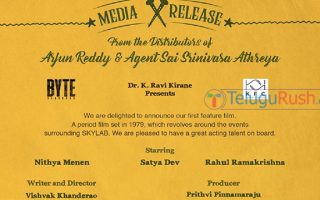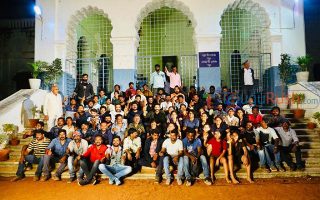Samarla Venkata Ranga Rao (SV Ranga Rao), popularly known as S. V. R., was an actor, producer, and director known for his works in Telugu and Tamil films. He garnered various state, National and International honors over a career spanning 28 years. SV Ranga Rao is one of the finest method actors in the history of world cinema. He is fondly called ‘Vishwa Nata Chakravarthi’ and permanently etched his name in the history of Indian cinema.

Early Life and Film Career
SV Ranga Rao was born on 3rd July 1918, to Koteswara Rao and Lakshmi at Nuzvidu town in Krishna district, Andhra Pradesh. His mother, Lakshmi Narassayamma, was a staunch devotee of Lord Venkateshwara and named the boy after him. His father sent him to Madras presidency for schooling where he completed his schooling at Hindu college. He had an immense interest in stage acting since a very young age. He completed his B.Sc. and got a job in Fire Service in the cadre of an officer. His mind was preoccupied with the thoughts of stage-plays and film acting. He was ambitious to do M.Sc. and to take part in dramas and films.
During that time, he got an invitation from one of his relatives, B. V. Ramanandam, to enact the role of the protagonist. He immediately abandoned his job and left for Salem to start his acting career. The film, Varudhini (1946), had Dasari Tilakam (mother of popular actress, Girija) as the female lead. SV Ranga Rao was accustomed to male company and essayed female roles in dramas, so the on-screen intimacy left him in discomfort. He almost gave up his acting career but Ramanandam insisted he stay. The result of Varudhini was disappointing and the film tanked at the box office. The producers showed no interest in casting him in their films. SV Ranga Rao was disillusioned with the colorful world of cinema. He left Madras presidency for a job as Budget assistant with the Tata company in Jamshedpur. He married Leelavathi on 27 December 1947.

Success and Recognition
He couldn’t give up on his dreams of an acting career, so he used to meet his friend B. A. Subba Rao once in a while. His second film, ‘Mana Desam’, starring Chittoor V. Nagaiah in the lead role, was the debut movie of N. T. Rama Rao as an actor and Ghantasala as a music director. At this time, he got an opportunity to play the villain in the film, Palletoori Pilla. B. A. Subba Rao has written, produced, and directed the film. His father expired when he was about to take a train to Chennai. After performing the final rites, he reached Chennai but learned that someone else replaced him. He continued to do minor roles in films. His family wasn’t supportive during this phase. Moreover, his relatives ridiculed him saying that only a fool would choose an acting career by shunning the Government jobs. His wife Leelavathi would often go back to her parents as a protest to his acting career and erratic schedules. SVR promised her a bright future and lived up to his words.
Fame and Stardom
Vijaya Pictures offered him his first major role, that is ‘Nepala Mantrikudu’ role in ‘Pathala Bhairavi’ (1951). Being an ardent fan of Shakespeare, he took Shylock’s look and characterization from ‘Merchant of Venice’ as a basis for his tantric role in Pathala Bhairavi. He never looked back and became popular throughout India. Pathala Bhairavi was screened at the first India International Film Festival held in Mumbai on 24 January 1952. SV Ranga Rao received wide reception for his portrayal of Nepala Mantrikudu. He acted in both Telugu and Tamil versions of ‘Pelli Chesi Choodu’ which made him the most sought-after actor of that time and highest-paid actor of the 50s. In spite of being a character artist, he used to get higher remuneration compared to the lead actors such as NTR and ANR.
International Recognition
He was popular for his natural acting style and dialogue delivery. He enacted the role of Ghatotkacha in Maya Bazar (1957) which is regarded as the greatest Indian film of all time by CNN-India poll. Maya Bazar had an ensemble cast of N. T. Rama Rao, Akkineni Nageswara Rao, Savitri, etc. but SV Ranga Rao dominates them all with his amazing performance. The 1957 International Film Festival of India and the Indonesian Film Festival screened Maya Bazar. He used to live in his role in the sets and at his home, and talk, behave and walk exactly like the character.
SV Ranga Rao was a soft-spoken person with a very good sense of humor which used to attract people and he was often called a people magnet. He even rejected several protagonist roles thinking that they would restrict him as an actor. SV Ranga Rao enacted several historical and mythological roles including Bhishma, Duryodhana, Akbar, Yama, Ravana, Tandra Paparayudu, Bhoja, Daksha, Harischandra, Hiranyakashipu, Kamsa, Keechaka, Mayasura, and Narakasura.

Vishwa Nata Chakravarthi
He won the best actor award for his portrayal of Keechaka in Narthanasala at the Indonesian Film Festival. He was the first Indian actor to receive an international award. This award made him feel sad that his own country couldn’t honor his talent. His contemporary actor, Gummadi Venkateswara Rao, exclaimed, “Fortunate are we to have SVR born in India but SVR is unfortunate to have been born here. If he was born in the West he would have been one of the top 5 actors of all time in the world”. SV Ranga Rao had no interest in producing and directing films considering the financial pitfalls of his contemporary actors. However, he produced 4 films and directed 2 of them himself. The Two films that he directed received state Nandi awards but weren’t commercially successful.
SV Ranga Rao used to be moody on-sets and did not discuss his personal life with his industry friends. He was a busy actor throughout his career. And continued to act until his last days. SV Ranga Rao had a cardiac arrest at Hyderabad in February 1974. He was admitted to Osmania General Hospital and later discharged. On 18 July 1974 at Chennai, another attack proved fatal and before they could institute any medical treatment, he passed away. He continues to live in the annals of Tollywood and Kollywood film history.




Very proud to have such talented Telugu actors in 50s,
like Mr. Nagaiah, SV Rangarao, NTR, ANR etc.
I also remember to have read that he was awarded by France Government also for his acting.
I also read that the same award was given to Narayana Rao another Telugu actor and oly these two Indian actors are the recipients